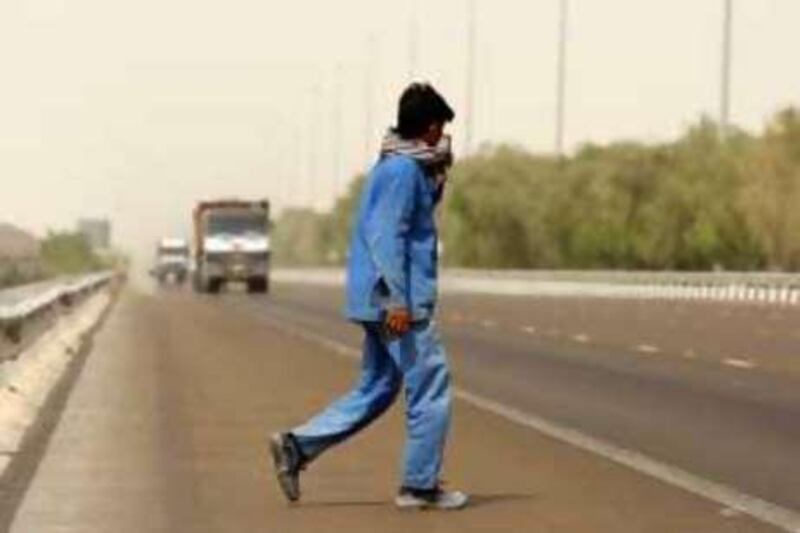ABU DHABI // Despite police campaigns against jaywalking, construction workers still dash across the eight-lane Abu Dhabi-Dubai motorway between Khalifa City and Al Raha Mall, risking their lives in high speed traffic to get a bite to eat. Labourers on construction sites near the motorway say they make the potentially fatal run to buy food at Lulu Express in the mall. They know jaywalking is illegal and dangerous, but say in the absence of an overpass or underpass they have no option.
The grocery is the nearest food outlet in the area, although some labourers frequent a nearby supermarket in Khalifa City. "Of course it is dangerous," said Amin Khan, 40, a worker who was buying groceries with a colleague at Lulu Express. "But we have to do it. When our food goes bad we have no other choice." Moments later, the two Pakistanis hurdled the crash barriers and dashed across four lanes to a median lined with palm trees. As cars and lorries whizzed by at speeds of at least 120kph, they waited for a break in the traffic before dashing across four more lanes.
A footbridge connecting Khalifa City and the mall is among 32 planned in the capital to make the roads safer for pedestrians. Construction would begin soon, Dr Atef Garib, transport expert for Abu Dhabi Municipality, said last month. In the meantime, motorists such as Ali Kaddas, an Emirati businessman who travels the motorway regularly, say the labourers crossing the motorway are a hazard. "Don't forget, many of their uniforms are green, so they are camouflaged by the grass and trees in the median" said Mr Kaddas, 32. "When suddenly he jumps onto the road you think it's like a branch of a tree falling down."
Mr Kaddas said he once came close to knocking over a jaywalker near the mall who suddenly stopped in a middle lane of the motorway. "He was afraid to cross the rest of the way because there was a chain of cars," Mr Kaddas said. "He was stopped in the middle of the road and I didn't see him at first." Zaldy Mejia, 42, agreed that the jaywalkers were a hazard on the roads. "When you are driving 150kph and then you see them running across, you can never tell if they are going to pass through or not," he said. "I think there should be a security fence on this side to prevent them from getting across."
The jaywalking labourers said they had been warned by police not to attempt the crossing. Mohinder Chan, from India, said he had heard of police fining jaywalkers in the area, but had not seen patrol cars in the afternoons, the preferred time for crossing because the traffic was light. "We wait until the road is empty and then we run," he said. Police want to stop the practice of jaywalking around the capital to help to reduce pedestrian accidents. Some 2,022 pedestrians were hit by vehicles in the country last year, a rise of more than 16 per cent over 2006. Of those, 583 were hit in the capital.
Police fined 580 jaywalkers in a two-week blitz in Musaffah in April. In January, the Abu Dhabi traffic and patrols department fined more than 3,000 jaywalkers during a week-long traffic safety awareness campaign. Police raised the fines for jaywalking in March to Dh200 (US$75) from Dh50, saying the lower penalty had failed to deter pedestrians. The head of Dubai's Traffic Public Prosecution recently said motorists who abided by the speed limit would not be liable for hitting jaywalkers.
Capt Haji al Bloushi, the traffic support manager of the Abu Dhabi traffic and patrols department, said pedestrians should obey the law for their own safety. There are 30 underpasses in the capital, but Mr Bloushi said not all pedestrians made use of them. "In Abu Dhabi, we have many nationalities with different knowledge and from different cultures," he said. "Even if we are doing our best to explain the law to them, some of them, I think, are careless for their own safety."
Some locations for bridges are still to be announced, but at least 12 will be built outside the city. Abu Dhabi's public beach along the Corniche would have two pedestrian bridges, Juma al Junaibi, general manager of the municipality, said at the opening of the beach on Wednesday. Mr Garib said another bridge would be built over a motorway in Shahama, linking a school to residents' homes. @Email:mchung@thenational.ae






